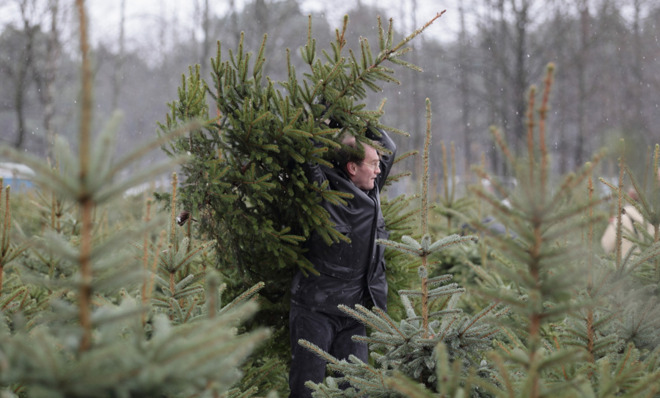Are Christmas trees bad for the environment?
Let's find out

A free daily email with the biggest news stories of the day – and the best features from TheWeek.com
You are now subscribed
Your newsletter sign-up was successful
Every December, millions of Americans adorn their living rooms with beautiful Christmas trees, both real and not-so-real. The National Christmas Tree Growers Association claims that more than 28 million trees will be sold in the United States this year, tallying more than $1 billion in sales.
That's a lot of trees. And it raises something of a dilemma for green-conscience do-gooders: Are Christmas trees bad for the environment?
The short answer: Maybe. There is a lot of confusing data out there mucking up the ecological toll Christmas trees take on Mother Nature. Part of that is due to the National Christmas Tree Association, which launched a vigorous anti-fake-tree offensive when real-tree sales fell precipitously in 2004. And that came in response to reactionary propaganda from the fake-tree industry.
The Week
Escape your echo chamber. Get the facts behind the news, plus analysis from multiple perspectives.

Sign up for The Week's Free Newsletters
From our morning news briefing to a weekly Good News Newsletter, get the best of The Week delivered directly to your inbox.
From our morning news briefing to a weekly Good News Newsletter, get the best of The Week delivered directly to your inbox.
Here's what we do know. The New York Times reported in 2010 that an independent study from Ellipsos found that fake trees — which can be re-used year after year — usually contain a dubious chemical called polyvinyl chloride, or PVC, "which produces carcinogens during manufacturing and disposal."
Carbon emissions associated with real trees were discovered to be about a third of those created by artificial trees over what's said to be their "typical six-year lifespan." When fake, plastic trees have outlived their usefulness, they usually end up in landfills and aren't biodegradable. Researchers claim you need to eke out over a decade of use to see returns.
But real trees aren't without their drawbacks. "If you use an artificial tree for 10 years, you need 10 trees, and that is 70 years worth of growing trees," said Thomas Harman, who serves on the board of the American Christmas Tree Association, a non-profit group. "You have 70 years of water and pesticide consumption. Those have environmental costs, too."
Real trees do, however, tend to give a little bit back to Mother Nature. During the eight to 12 years they spend rooted in soil, they soak up carbon dioxide, and provide a home for birds and small mammals. They are also biodegradable. The University of Illinois Extension points out that 98 percent of all real trees are grown and harvested on farms, meaning the industry is largely sustainable.
A free daily email with the biggest news stories of the day – and the best features from TheWeek.com
So what's your best bet if you'd like to celebrate future Christmases in (slightly) better conscience? Depending on where you live and if cost isn't an issue (which is a lot to ask for many households), you should select a Christmas tree from a local farm. The closer it's grown, the less fuel is required to transport it, and the smaller its overall carbon footprint. Just remember to recycle come January.
Either way, though, you're probably not doing too much harm to the environment. "When you really consider it, if you exchange a couple of days of commuting by car with carpooling or riding a bicycle, you'll completely overcompensate for whatever the impact of the tree is," Ellipsos researcher Jean-Sebastien Trudel told The Times. "It's not such a big deal. Enjoy your tree, whichever one you prefer."
-
 ‘Poor time management isn’t just an inconvenience’
‘Poor time management isn’t just an inconvenience’Instant Opinion Opinion, comment and editorials of the day
-
 Bad Bunny’s Super Bowl: A win for unity
Bad Bunny’s Super Bowl: A win for unityFeature The global superstar's halftime show was a celebration for everyone to enjoy
-
 Book reviews: ‘Bonfire of the Murdochs’ and ‘The Typewriter and the Guillotine’
Book reviews: ‘Bonfire of the Murdochs’ and ‘The Typewriter and the Guillotine’Feature New insights into the Murdoch family’s turmoil and a renowned journalist’s time in pre-World War II Paris